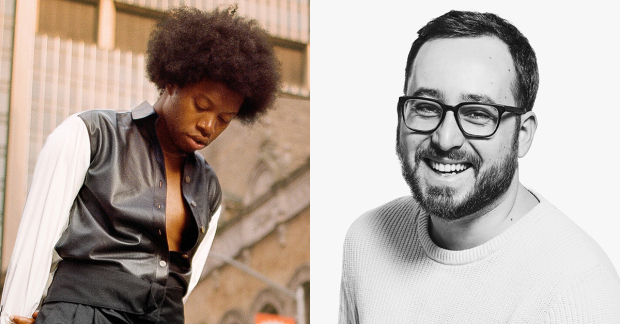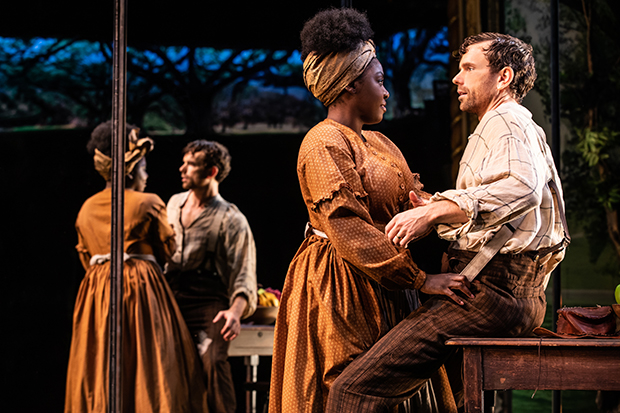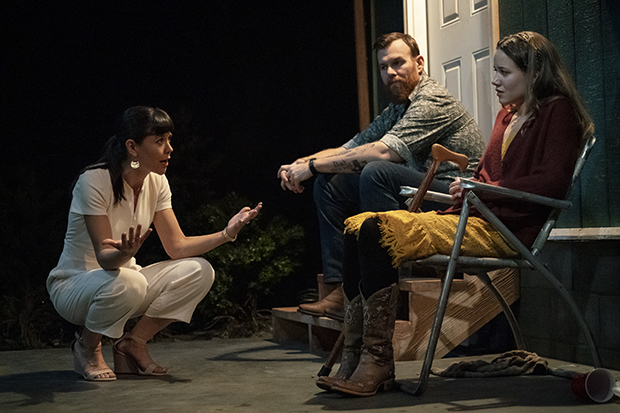A Conversation With Playwrights Will Arbery and Jeremy O. Harris
The two writers discuss their breakout plays, ”Heroes of the Fourth Turning” and ”Slave Play”.
"Everyone seems to come to the idea of, 'You know what would be really crazy? A conversation with Jeremy and Will. Who would ever put those two in a room together?'" Playwright Jeremy O. Harris asks this question with a hint of skepticism. "We were literally drawn together like magnets."
"And there are people on Twitter who are like, 'I had the idea to go see Slave Play and Heroes of the Fourth Turning back to back,'" playwright Will Arbery adds with a laugh. "We're like, 'That was literally the plan.' Not that we wrote these plays to be in conversation, but since we've been aware of each play, we've been aware that they are.'"
Harris and Arbery have known each other for quite a while, and have shared their nascent plays with each other for years. But this fall marked a turning point in both of their careers, with the Broadway premiere of Harris's Slave Play, an examination of race and sex, at the Golden Theatre, and Arbery's fast ascent to the theatrical consciousness with Heroes, a portrait of a group of religious conservatives in Wyoming, at Playwrights Horizons (through November 17).
The two playwrights were eager to have a conversation to discuss their work and the cultural influences surrounding these much-talked-about dramas, so naturally, it wasn't a very crazy idea at all.
This interview has been condensed and edited for clarity.

(© Quil Lemons/Zack DeZon)
What were your reactions when you read each other's plays, Slave Play and Heroes of the Fourth Turning, for the first time?
Jeremy O. Harris: I immediately loved Heroes. My biggest fear is that, in a moment when people are having really necessary conversations about who's being represented and how everyone will feel as though the right response is to lean away from anything that might cause discomfort. The uncomfortable things in Heroes are what made me really excited, so I wanted Will to lean into it more. I was really angry that I wasn't able to run into the middle of Wyoming and yell at the characters. [laughs]
Will Arbery: I thought the structure of Slave Play was next-level brilliant and really relentless. I recognized an artist who was trying to go as deep into a really scary and impossible question as they could, and wasn't backing down, and was going farther faster than anyone could possibly be prepared for. That's the kind of work I really respond to.

(© Matthew Murphy)
How are these plays in conversation with each other?
Jeremy: These plays look at the relationship between the physical body, the unsettling spirituality that exists in our country that we can't do anything with, and what that means for our souls, how we wrestle with these things that start in the body and cause it to fall apart. In a lot of ways, it's about how our identities stop us from living fully, and how our minds cause barriers that prevent us from listening to what the world is asking from us.
Will: There is a parallel that can be drawn between what Kaneisha in Slave Play is carrying in her body — the ways in which her OCD is manifesting, and what the Rihanna song blaring does to her body — and the way that the generator sound in my play is operating, and the effect that it has on Emily's body.
Jeremy: One parallel that we've espoused very loudly is that we wanted to make plays for communities that don't have plays about them in the theatrical canon. While black bodies are in the theatrical canon, I had never seen black bodies that talk the way mine do. It's interesting how many people are like, "I reject this play because I reject the entire concept of what Kaneisha wants. Either that's not real, or if it is, I don't want to see it."
Will: There are huge debates about a lot of things, like abortion, in my play, that are really triggering for people. I know your play has its own equivalent of that. It's something I've been struggling with a little bit. We actually had to stop calling it the "abortion debate" in rehearsal, because it's really a debate about goodness and "can you be good if you're doing something that I view as evil." I'm learning that there are a lot of people who watch that debate and are like, "I didn't know it was going to go here so intensely, and if I had, maybe I wouldn't have come."

(© Joan Marcus)
A lot of people are projecting cut-and-dried thoughts about whom they think these plays were written for. But I don't think there's a simple answer, is there?
Jeremy: In my play, I wanted to dramatize three black people becoming themselves and taking up space. But when I sit down to write, I'm not thinking about who it's for; I'm thinking about what the best play is for me as an audience member.
Will: What's been implied for both of us is that we were trying to invite people in who don't normally get invited in, but that doesn't mean the whole project has become for those people. I made a very conscious effort to invite all of these religious conservative thinkers and get them talking about it, but ultimately, I think my play is for anyone who wants to be challenged to look at some hard truths about what it means to be alive in this country right now. Anyone who doesn't want to be challenged isn't going to like my play.
Jeremy: Everyone will come to these plays and have issues. Multiple black and white people have come to my play and are like "absolutely not." Multiple conservatives and liberals are like "absolutely not" about Heroes. I was with a white male playwright and he was telling me his issue with your play was that liberals are talking about it as though it's a peek behind the curtain at real Republicans, but he didn't think they were real Republicans because they weren't overtly saying racist things. I think what I was hearing was someone asking for a play about Trumpian Republicans, and what's exciting is that you've written a play that's so not of that world. Have you heard critiques asking why these Republicans are so academic?
Will: I've definitely gotten questions about that. There's a sense among some viewers that an intellectual Republican is an oxymoron. If they need their confirmation bias to be fulfilled, that's at their own peril. There's so much intellectual scaffolding behind the conservative movement in this country. So much of it comes from highly educated, religious academics who either teach or write for small magazines with titles like Law and Liberty. They're creating new language codes and they're publishing them, and that filters into the ears of people like Tucker Carlson, he gets it into the Fox News sphere, it goes into Trump's ear, and then it goes into everyone's ear. It starts with these people. So why not write about that person?









